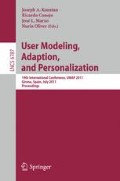Abstract
Over the last decades, there have been a rich variety of approaches towards modeling student knowledge and skill within interactive learning environments. There have recently been several empirical comparisons as to which types of student models are better at predicting future performance, both within and outside of the interactive learning environment. However, these comparisons have produced contradictory results. Within this paper, we examine whether ensemble methods, which integrate multiple models, can produce prediction results comparable to or better than the best of nine student modeling frameworks, taken individually. We ensemble model predictions within a Cognitive Tutor for Genetics, at the level of predicting knowledge action-byaction within the tutor. We evaluate the predictions in terms of future performance within the tutor and on a paper post-test. Within this data set, we do not find evidence that ensembles of models are significantly better. Ensembles of models perform comparably to or slightly better than the best individual models, at predicting future performance within the tutor software. However, the ensembles of models perform marginally significantly worse than the best individual models, at predicting post-test performance.
Access this chapter
Tax calculation will be finalised at checkout
Purchases are for personal use only
Preview
Unable to display preview. Download preview PDF.
References
Baker, R.S.J.d., Corbett, A.T., Aleven, V.: More Accurate Student Modeling through Contextual Estimation of Slip and Guess Probabilities in Bayesian Knowledge Tracing. In: Woolf, B.P., Aïmeur, E., Nkambou, R., Lajoie, S. (eds.) ITS 2008. LNCS, vol. 5091, pp. 406–415. Springer, Heidelberg (2008)
Baker, R.S.J.d., Corbett, A.T., Gowda, S.M., Wagner, A.Z., MacLaren, B.A., Kauffman, L.R., Mitchell, A.P., Giguere, S.: Contextual Slip and Prediction of Student Performance after Use of an Intelligent Tutor. In: De Bra, P., Kobsa, A., Chin, D. (eds.) UMAP 2010. LNCS, vol. 6075, pp. 52–63. Springer, Heidelberg (2010)
Brusilovsky, P., Millán, E.: User models for adaptive hypermedia and adaptive educational systems. In: Brusilovsky, P., Kobsa, A., Nejdl, W. (eds.) Adaptive Web 2007. LNCS, vol. 4321, pp. 3–53. Springer, Heidelberg (2007)
Chang, K.-m., Beck, J.E., Mostow, J., Corbett, A.T.: A bayes net toolkit for student modeling in intelligent tutoring systems. In: Ikeda, M., Ashley, K.D., Chan, T.-W. (eds.) ITS 2006. LNCS, vol. 4053, pp. 104–113. Springer, Heidelberg (2006)
Corbett, A., Kauffman, L., Maclaren, B., Wagner, A., Jones, E.: A Cognitive Tutor for Genetics Problem Solving: Learning Gains and Student Modeling. Journal of Educational Computing Research 42, 219–239 (2010)
Corbett, A.T., Anderson, J.R.: Knowledge Tracing: Modeling the Acquisition of Procedural Knowledge. User Modeling and User-Adapted Interaction 4, 253–278 (1995)
Gong, Y., Beck, J.E., Heffernan, N.T.: Comparing Knowledge Tracing and Performance Factor Analysis by Using Multiple Model Fitting Procedures. In: Aleven, V., Kay, J., Mostow, J. (eds.) ITS 2010. LNCS, vol. 6094, pp. 35–44. Springer, Heidelberg (2010)
Koedinger, K.R., Corbett, A.T.: Cognitive tutors: Technology bringing learning science to the classroom. In: Sawyer, K. (ed.) The Cambridge Handbook of the Learning Sciences, pp. 61–78. Cambridge University Press, New York (2006)
Pardos, Z.A., Heffernan, N.T.: Modeling Individualization in a Bayesian Networks Implementation of Knowledge Tracing. In: De Bra, P., Kobsa, A., Chin, D. (eds.) UMAP 2010. LNCS, vol. 6075, pp. 255–266. Springer, Heidelberg (2010)
Pardos, Z.A., Heffernan, N.T.: Navigating the parameter space of Bayesian Knowledge Tracing models: Visualizations of the convergence of the Expectation Maximization algorithm. In: Proceedings of the 3rd International Conference on Educational Data Mining, pp. 161–170 (2010)
Pardos, Z.A., Heffernan, N.T.: Using HMMs and bagged decision trees to leverage rich features of user and skill from an intelligent tutoring system dataset. To appear in Journal of Machine Learning Research W & CP
Pavlik, P.I., Cen, H., Koedinger, K.R.: Learning Factors Transfer Analysis: Using Learning Curve Analysis to Automatically Generate Domain Models. In: Proceedings of the 2nd International Conference on Educational Data Mining, pp. 121–130 (2009)
Pavlik, P.I., Cen, H., Koedinger, K.R.: Performance Factors Analysis – A New Alternative to Knowledge Tracing. In: Proceedings of the 14th International Conference on Artificial Intelligence in Education, pp. 531–538 (2009), Version of paper used is online at http://eric.ed.gov/PDFS/ED506305.pdf (retrieved January 26, 2011); This version has minor differences from the printed version of this paper
Rai, D., Gong, Y., Beck, J.E.: Using Dirichlet priors to improve model parameter plausibility. In: Proceedings of the 2nd International Conference on Educational Data Mining, Cordoba, Spain, pp. 141–148 (2009)
Reye, J.: Student modeling based on belief networks. International Journal of Artificial Intelligence in Education 14, 1–33 (2004)
Caruana, R., Niculescu-Mizil, A.: Ensemble selection from libraries of models. In: Proceedings of the 21st International Conference on Machine Learning, ICML 2004 (2004)
Wang, Q.Y., Pardos, Z.A., Heffernan, N.T.: Fold Tabling Method: A New Alternative and Complement to Knowledge Tracing (manuscript under review)
Yu, H.-F., Lo, H.-Y., Hsieh, H.-P., Lou, J.-K., McKenzie, T.G., Chou, J.-W., et al.: Feature Engineering and Classifier Ensemble for KDD Cup 2010. In: Proceedings of the KDD Cup 2010 Workshop, pp. 1–16 (2010)
Author information
Authors and Affiliations
Editor information
Editors and Affiliations
Rights and permissions
Copyright information
© 2011 Springer-Verlag Berlin Heidelberg
About this paper
Cite this paper
Baker, R.S.J.d., Pardos, Z.A., Gowda, S.M., Nooraei, B.B., Heffernan, N.T. (2011). Ensembling Predictions of Student Knowledge within Intelligent Tutoring Systems. In: Konstan, J.A., Conejo, R., Marzo, J.L., Oliver, N. (eds) User Modeling, Adaption and Personalization. UMAP 2011. Lecture Notes in Computer Science, vol 6787. Springer, Berlin, Heidelberg. https://doi.org/10.1007/978-3-642-22362-4_2
Download citation
DOI: https://doi.org/10.1007/978-3-642-22362-4_2
Publisher Name: Springer, Berlin, Heidelberg
Print ISBN: 978-3-642-22361-7
Online ISBN: 978-3-642-22362-4
eBook Packages: Computer ScienceComputer Science (R0)

